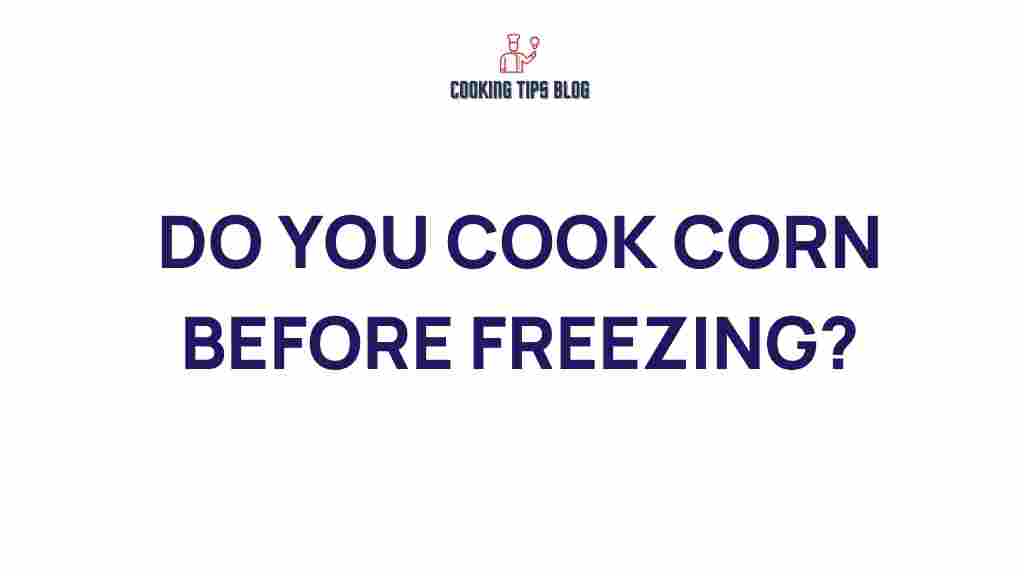Is Cooking Corn Before Freezing a Necessary Step?
Corn is a beloved vegetable that brings sweet, juicy flavors to a variety of dishes. When the corn is in season, it’s common to buy in bulk or harvest from your own garden. However, if you want to preserve that fresh taste for later use, you might wonder: is cooking corn before freezing a necessary step? This article will explore the benefits of cooking corn, the best methods for freezing it, and whether skipping this step is feasible. So, let’s get started!
The Importance of Cooking Corn
Cooking corn before freezing is generally recommended for several reasons:
- Preservation of Flavor: Cooking corn enhances its sweetness and flavor. By cooking it briefly before freezing, you lock in that delicious taste.
- Texture Improvement: Cooking corn helps to soften its kernels, making them more palatable when thawed.
- Inactivation of Enzymes: Raw corn contains enzymes that can cause it to deteriorate over time. Cooking helps to inactivate these enzymes, preserving quality and taste.
- Better Freezing Results: Cooked corn tends to freeze better than raw corn, minimizing the chances of freezer burn.
Step-by-Step Process for Cooking Corn Before Freezing
If you decide to cook corn before freezing, follow this simple process:
1. Select Fresh Corn
Choose ears of corn that are fresh, firm, and free of blemishes. The husks should be bright green, and the silk should be moist and sticky.
2. Husk and Clean the Corn
Remove the husks and silk from the corn. Rinse the ears under cool water to remove any dirt or debris.
3. Cooking the Corn
You have several options for cooking corn:
- Boiling: Fill a large pot with water, add salt if desired, and bring it to a boil. Add the corn and cook for 4-6 minutes.
- Steaming: Place corn in a steamer basket over boiling water and steam for 6-8 minutes.
- Grilling: Brush corn with oil and grill over medium heat for about 10-15 minutes, turning occasionally.
4. Cooling the Corn
After cooking, immediately transfer the corn to an ice bath to stop the cooking process. Let it cool for about 5 minutes.
5. Cutting and Packaging
Once cooled, you can either leave the corn on the cob or cut the kernels off. Use a sharp knife to slice the kernels into a bowl. Then, package the corn in airtight freezer bags or containers. Be sure to remove as much air as possible to prevent freezer burn.
6. Label and Freeze
Label your packages with the date and contents, then store them in the freezer. Cooked corn can typically last for up to 12 months in the freezer.
Can You Freeze Raw Corn? A Closer Look
While cooking corn before freezing is recommended, it is possible to freeze raw corn. However, this method comes with some caveats:
- Flavor Loss: Raw corn may lose some of its natural sweetness and flavor during freezing.
- Texture Issues: Freezing raw corn can result in a tougher texture once thawed.
- Shorter Shelf Life: Raw corn may not last as long in the freezer compared to cooked corn.
If you choose to freeze raw corn, follow these steps:
1. Husk and Clean
Similar to the cooked method, husk and clean the corn thoroughly.
2. Cut the Corn Off the Cob
Use a sharp knife to slice off the kernels, avoiding any hard bits.
3. Package and Freeze
Place the raw kernels in airtight freezer bags, removing excess air before sealing. Label the bags and place them in the freezer.
Troubleshooting Tips for Freezing Corn
Here are some common issues you may encounter when freezing corn and how to solve them:
- Freezer Burn: Ensure you remove as much air as possible from freezer bags. Using vacuum sealers can help prevent freezer burn.
- Loss of Flavor: To maintain flavor, use corn as soon as possible after freezing. Avoid keeping it in the freezer for extended periods.
- Texture Changes: To minimize texture changes, make sure to blanch (cook) the corn before freezing, even if you choose to freeze it raw.
Conclusion
In conclusion, while cooking corn before freezing is not strictly necessary, it is highly recommended for optimal flavor, texture, and preservation. Cooking corn enhances its natural sweetness and helps inactivate enzymes that can degrade quality over time. If you prefer to freeze raw corn, be aware of the potential issues and take steps to mitigate them. For the best results, follow the cooking, cooling, and packaging steps outlined above.
Whether you’re prepping for winter meals or simply looking to enjoy summer’s bounty all year round, proper freezing methods will ensure your corn remains delicious. So next time you’re faced with the decision, remember that cooking corn can be a simple yet effective way to maintain its quality for your future culinary adventures!
For more tips on freezing vegetables, check out this helpful guide. If you’re interested in learning how to use frozen corn in recipes, visit this page for delicious ideas!
This article is in the category Tools and created by Cookingtipsblog Team
